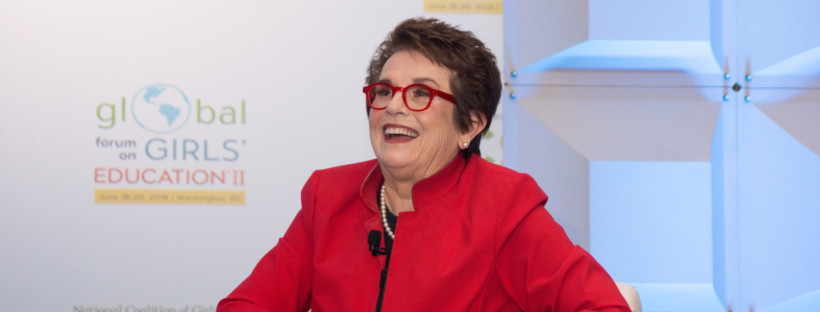Billie Jean King: A Model of Authentic Leadership

February 6 will mark more than three decades of celebrating National Girls & Women in Sports Day (NGWSD). Powered by the Women’s Sports Foundation, NGWSD acknowledges the accomplishments of female athletes, the positive benefits of sports participation, and the ongoing fight for equality for women in sports. As this important day of recognition approaches, I find myself reflecting on a talk I gave to the Foxcroft community at the start of the school year. I asked the students to identify the women in a photo taken of Serena Williams accepting the 2014 Women’s Tennis Association Finals cup from Billie Jean King. Quite a few hands went up, and a student correctly identified Williams.
I shared what I had learned about Williams: that she holds the most Grand Slam titles in singles, doubles, and mixed doubles combined among active players—male and female. She also won four Olympic gold medals—an all-time record shared with her sister, Venus. The Williams sisters have been credited with leading a new era of power and athleticism on the women’s professional tennis tour. Earning almost $29 million from tournaments and endorsements, Serena Williams was the highest paid female athlete in 2016 and 2017. Further, since her return to the court after having a baby, she has been an advocate for working mothers.
I then asked if anyone knew who the other woman was. Very few hands went up, but one brave sophomore correctly identified Billie Jean King.

Photo Credit: Photosport
By her own right, King is considered one of the best tennis players of all time, known for defeating Wimbledon champion Bobby Riggs in 1973 in an exhibition match, coined by the frenzied media as the “Battle of the Sexes.” King defeated Riggs in straight sets: 6-4, 6-3, 6-3. I remember my parents and I gathered around the television to watch this historic event. I jumped up and down with excitement at her victory, feeling a barrier had been broken for her and all women.
Last summer, several Foxcroft faculty and I had the privilege of hearing Billie Jean King speak at the Global Forum on Girls’ Education II, an unprecedented conference of educators from around the world convened by the National Coalition of Girls’ Schools (NCGS). King was one of several featured presenters, all of them professional leaders and activists, and in many cases, global pioneers. The lineup included Azar Nafisi, author of Reading Lolita In Tehran, an autobiography which tells of her courage to teach literature to seven women in her home after the leading party in Iran closed the universities, banned western books, and placed strict restrictions on women’s activities; Halla Tomasdottir, a business leader and 2016 Presidential Candidate of Iceland, who defied conventional wisdom about how to appeal to voters by being true to herself and her values; and Sylvia Acevedo, CEO of the Girl Scouts of America, among others. But the highlight for me was Billie Jean King!
King is a pioneer in women’s sports. She had lots of firsts in her professional tennis career. Her “Battle of the Sexes” victory over Bobby Riggs not only garnered greater respect and recognition for women’s tennis overall, it challenged the elitism and exclusion that prevailed in the sport. She embraced the cause of equal pay for women. After she won the US Open in 1972, she was paid less than the men’s champion and declared she would not play the next year if the prize money was not equal. Because of her advocacy, the US Open became the first grand slam tournament to offer equal prize money for men and women.
And lest you think this issue is history, note that the US Women’s Soccer Team is suing for pay equal to the men’s team.
King, who founded the Women’s Sports Foundation in 1974, has a list of accomplishments that are too great to include here. In hearing King speak, I was struck by how her life’s work has been about values-based leadership. While her early career was focused on individual successes through fierce training and competition, she took her hard-earned success and made tremendous differences in support of diversity, equity, and inclusion in our society at large.
As we educate our girls and young women to be authentic leaders, Billie Jean King is just one of many examples available to help girls “see it to be it.”
At girls’ schools, students are surrounded by faculty who work to advance girls’ education on their campuses and around the world. The optimism, faith, and promise we hold for our students, the young women who will be our future authentic leaders, is palpable. As Megan Murphy, Executive Director of NCGS, said, our goal is to help our students become “the women our world needs now.”
Cathy McGehee, Head of School, Foxcroft School
Related tags: Advancing Girls' Education, All-Girls Environment, All-Girls Schools, Authentic Leadership, Billie Jean King, Developing Girls as Leaders, Female Athletes, Global Forum, Global Forum on Girls' Education, Global Leaders, Halla Tómasdóttir, How Girls Learn to Lead, Leadership, National Girls & Women in Sports Day, Responsible Leadership, See It To Be It, Serena Williams, Women's Sports Foundation